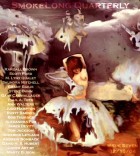“Not the Real Jesus Christ” is just superb, Bob. I love the dialogue in this story. It isn’t until the final line that the intensity of the narrator’s emotion becomes clear. Did that line surprise you when you wrote it?
Let me first say thank you for liking the story. At the outset I wanted a lot of play in the dialogue between these four characters. As to the last line, I’d guess it did surprise, or sneak up on me, because it’s not in the early drafts. I think it’s the right line, the right emotion, demonstrating the man’s sentiment. I hope it is. Though honestly I don’t remember how or when it got there. The story was started in the spring of 2002, and reworked many times after that.
You’ve published something like two million micros and flashes in The Phone Book and elsewhere. What, in your opinion, makes for successful microfiction?
Difficult question to answer. I’d have to say: one solid emotional effect, with one or two potent images supporting that effect, or mood; and of course a clear voice, an authoritative voice; all of it presented in concise prose that expands in the reader’s mind well beyond the story’s word count. Build it, then sand and polish it down, until all that’s left is a well structured narrative that, much like poetry, manages to support more emotional weight than it seemingly should.
In your bio, you mention that you studied writing for 25 years before submitting anything. Why is that?
I’m a slow learner. And I’m somewhat obsessive. From the beginning (age twenty or so) I understood I’d require a lengthy apprenticeship if I were ever to call myself a legitimate writer. Over the years, the more I studied, the more I realized how little I knew. I was pretty damn serious about my development, about learning good technique, and I remain very passionate about the principles and ideals of good fiction, and fervent (almost hot headed about the errors and violations one must be mindful of, but I was not at all concerned about publication. I pretty much considered everything I wrote no more than exercise, just good practice, and not worth bothering an editor about.
Tell us about Microfiction.Net.
Sure. Sometime last year someone suggested I teach a class on writing microfiction to help other writers better understand the ultra short form. I was flattered by the suggestion, and I’d like to try that someday, but over the summer I got to thinking what could I do right now to help other writers producing works of art in just a few hundred words.
I talked to a few friends, some other writers (a couple of them very successful authors) all good people who know and respect the ultra short form and its long tradition. We exchanged ideas.
More than simply introducing another magazine or ezine, I wanted to create the source for a book, an annual anthology, fed by an online venue, something that would attract real talent. My nephew Jason, who is a bright young man, thinks it’s an absolutely remarkable thing how fictions float on the internet, and that decades from now some of that work may still be available. So I wanted that feature, along with the printed book.
So I planned and plotted, then spent an entire day bouncing my ideas off a dear friend who just happens to be a literary genius. With his help, MicroFiction.net was conceived as a showcase for legitimate short stories that fit on a page or two. The idea being to present the stories first online, to make them easily assessable, then every year to publish those same works in a nice print anthology.
There simply aren’t enough venues for good literary “short shorts” on or off the internet. The difficult part, of course, was funding such an operation, because I thought it essential to pay the writers. My wife and I calculated the operational costs for the first couple of years and we shook our heads, then we pulled the trigger. Our feeling is that we’re investing in talent, and that’s never a bad thing.
You currently have a novel under consideration by publishers. How did you approach writing a longer work?
Not very well. I had started three novels previously, found the long form exacting, and had more or less abandoned those attempts, and returned to the exercise of the short form. But I accumulated a lot of material, hundreds of pages with common characters and a persistent theme, so after reviewing that material, I started again with a clearer intent on a novel titled Paperboy.” But with a different point of view, and a minimalist structure. I’d been at work on this version about six months, when my stories enticed an agent to take me on. He needed the novel so I moved into high gear, and set my sites on finishing the manuscript. The result is a fragmented novel, a mosaic of vignettes, many of which might stand alone as “short shorts.” I call it a dysfunctional novel, because its form mirrors the characters’ lives. There’s an overall, uneasy, jittery flow, the story line fading in and out. And few “transitions.” My agent didn’t care for the “experimental” nature of the work, and the theme wasn’t to his taste, but I was fortunate to find another agent who loves the manuscript. He believes he can sell it. I certainly hope he can.



 The core workshop of SmokeLong Fitness is all in writing, so you can take part from anywhere at anytime. We are excited about creating a supportive, consistent and structured environment for flash writers to work on their craft in a community. We are thrilled and proud to say that our workshop participants have won, placed, or been listed in every major flash competition. Community works.
The core workshop of SmokeLong Fitness is all in writing, so you can take part from anywhere at anytime. We are excited about creating a supportive, consistent and structured environment for flash writers to work on their craft in a community. We are thrilled and proud to say that our workshop participants have won, placed, or been listed in every major flash competition. Community works.